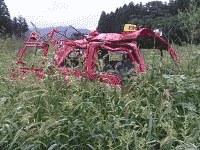Six months have passed since the disaster. During the past five months since we launched our post-disaster support action, we have delivered to the evacuation shelters tea, handicrafts, hand massage and manicure services, along with various other gifts full of care from people across the country.
In September, we finally opened the long-anticipated salon at the temporary housing, where we had a happy reunion with familiar faces from evacuation centers. On the other hand, as of mid-September, about 100 people were still living in evacuation centers in Onagawa. Temporary houses were to be completed for them to move in at the end of October.
 Over the last several months, we’ve visited places across Miyagi Prefecture along with people from all around Japan. I want them to tell stories of what they saw, once back at home. In Miyagi, time seems to have healed the damages inflicted by the disaster. Overgrown summer grass now obscures the traces of houses destroyed by tsunami, casting a calm image of under-populated countryside. At such moments of illusion, I’d desperately explain to the visitors, “No, no! There were houses lining up here. A lot of people used to live here and called this place their home.”
Over the last several months, we’ve visited places across Miyagi Prefecture along with people from all around Japan. I want them to tell stories of what they saw, once back at home. In Miyagi, time seems to have healed the damages inflicted by the disaster. Overgrown summer grass now obscures the traces of houses destroyed by tsunami, casting a calm image of under-populated countryside. At such moments of illusion, I’d desperately explain to the visitors, “No, no! There were houses lining up here. A lot of people used to live here and called this place their home.”
Meanwhile, we’ve also had several inquiries from outside Miyagi, asking for goods made by the survivors. Buying local products is an effective way to support the economy of the devastated region. Unfortunately, however, we just managed to deliver sewing kits and sewing machines to the women in Miyagi, and still have a way ahead before we’d be able to sell goods. The only local products that can be sold are lavers.
As we try to connect people of Miyagi and those from other areas of Japan, I realized about a few things. For one, material supplies necessary for reconstruction do not always reach those intended hands as quickly as people in need hope. Likewise, it takes more time for the towns hit by the disaster to recover enough to manufacture goods than the people outside would imagine.
We need to continue speaking out to let them know what we go through every day. We advocate for the needs of the people who are struggling to rebuild their lives, and that is just the same as advocating for domestic violence victims, which is what we do.
We often receive encouraging words from women of Miyagi we support. “It was fun to be with you. We’ll move into temporary shelters, but come see us sometime, okay?”
Of course, I’m delighted to visit them in their new homes.
Etsuko Yahata, Miyagi Jo-Net
